The rise and fall of Tarun Tejpal
The rise and fall of Tarun Tejpal
mangaloretoday.com
By Kunal Pradhan and Gayatri Jayaraman | India Today
TARUN TEJPAL: An old TV spot for Tehelka shows a politician addressing a crowd in a village square in gobbledygook interspersed with random words such as "education" and "unemployment". As the speech goes on, the square gets infested by a murder of cawing crows, who sit on trees, electricity wires, and hand-pumps, until one of them perches on the microphone, forcing the politician to stop talking. The appearance of the tagline "Jhooth Bole Kauwa Kaate (utter a lie and the crow shall peck you)-an old Indian proverb" is followed by the grainy bearded face of Tarun Tejpal, printed on the top band of Tehelka, which was then a weekly tabloid. The implication is simple. The three Ts are synonyms-T for Tejpal, T for Tehelka, T for truth.
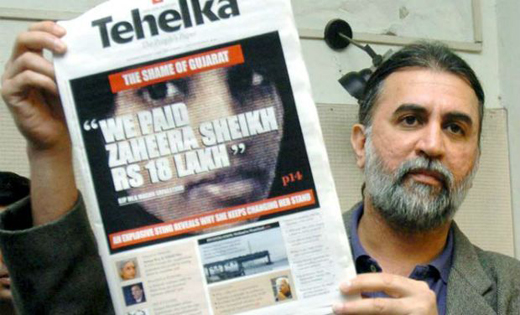
Tejpal’s face once again monopolises front pages and prime-time news bulletin-not as a champion of truth but as a violator of the ideals he stood for. In a career which in retrospect was a performance that matched ideas with idealism, activism with attitude, romance with rebellion, flair with finesse, Tejpal starred as wordsmith, iconoclast, impresario, inquisitor, debunker, entrepreneur, aesthete, lie-buster, controversialist, and conscience keeper. His appearance as an alleged sexual offender marks the lowest point in the tale of a man who has excelled in creating his own mythology.
It all began in a scene befitting his profile. In a carnival of ideas on the sunny beachfront of Goa, showcasing global icons such as Robert De Niro and Garry Kasparov, the dark story of sexual assault allegedly played out on two occasions on November 7 and 8. Two years ago, in his opening remarks at the same festival, Tejpal had told the audience to eat, drink, be merry, and "sleep with whoever you want". Tejpal has been accused by a junior colleague-who had been assigned the enviable task of chaperoning De Niro-of forcing himself on her in an elevator despite her protest. It’s almost surreal that one of the topics on Day 1 of the festival, on surviving rape, was ’The beast in our midst’.
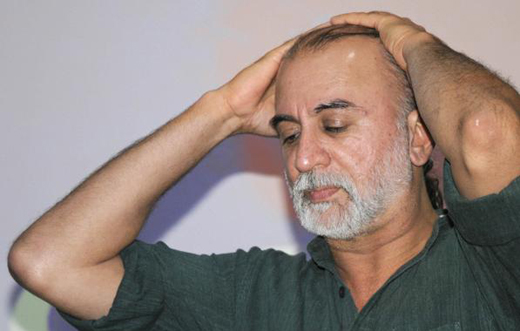
In an email sent directly to the journalist on November 19, a day after she had reported the incident to Tehelka’s managing editor Shoma Chaudhury, who has since resigned, Tejpal said, "The context that ill-fated evening, of our conversation, as you will recall, was heavily loaded. We were playfully and flirtatiously talking about desire... It was in this frivolous, laughing mood that the encounter took place. I had no idea that you were upset, or felt I had been even remotely non-consensual."
The next day, November 20, the 27-year-old woman, in her only direct correspondence with Tejpal since the charges became public, sent a stinging reply to his unofficial confession, in which she rebutted his version of the events point by point. She told Tejpal that the conversation on the night of November 7 was not "heavily loaded" or "flirtatious"-"you were talking about ’sex’ or ’desire’ because that is what you usually choose to speak to me about, unfortunately, never my work". She went on to write: "This is what non-consent constitutes: The moment you laid a hand on me, I started begging you to stop. I invoked every single person and principle that was important to us-Tiya (Tejpal’s daughter), Geetan (Batra, his wife), Shoma (Chaudhury), (name deleted, her father who is Tejpal’s former colleague), the fact that you were my employer-to make you stop. You refused to listen. In fact, you went ahead and decided to molest me again on the following night. We have often spoken of ’what turns men into beasts’ at Tehelka edit meetings. It is this-not being able to take no for an answer."
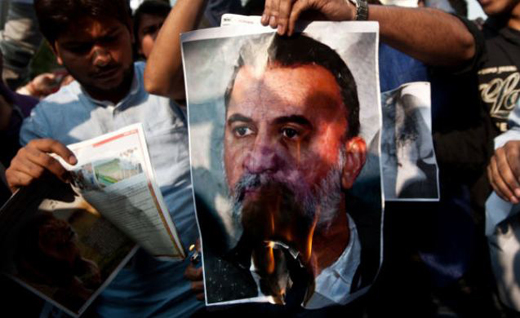
As his world crumbled around him, leading to resignations from his magazine and public abandonment by former friends, the 50-year-old Tejpal repeatedly changed his tone and his tune. On November 23, he retracted his unconditional apology in a text message saying that his "life and work have been trashed on a total lie". He then suggested that he was being "framed" by the BJP government in Goa, and finally, he went on to say in an anticipatory bail plea before the Delhi High Court on November 26 that the "alleged complaint is clearly motivated, false and an afterthought with oblique motive".
Tejpal’s statement, as one-time friend Arundhati Roy pointed out, implies that the journalist he had chosen to hire is now "not just a loose woman but an agent of fascists". His anticipatory bail plea order was reserved till November 29 but Tejpal withdrew the application a day before. Goa Police, which has taken suo motu cognisance of media reports, summoned him to appear at the Dona Paula police station on November 28, while the state’s Chief Minister Manohar Parrikar, closely monitoring the investigation, denied that his special interest was politically motivated. Tejpal wrote to Goa Police requesting if he could come to them on November 30, which was turned down and a non-bailable warrant for his arrest issued.
Like every other scandal, this one too, has triggered a political war. BJP leaders are using the Tehelka issue to blunt the Congress attack on Narendra Modi in the aftermath of Snoopgate. The battle-lines have been drawn on Tejpal since before Tehelka’s 2001 Operation West End, partly due to his lavish praise of the "luminous" Gandhi family. In 1997, after a controversy had broken out on the allotment of a government bungalow to Priyanka Gandhi and her husband Robert Vadra, Tejpal had written in a diary piece in Outlook: "She (Priyanka) is a very handsome woman who’s managed to maintain a dignified low profile even though she’s at the age when callow young hormones are routinely running amok. For another, even residual Jawahar and Indira genes make her a formidable political prospect, especially in a charisma-starved nation."
BJP leader Subramanian Swamy released a June 25, 2004 letter by Prime Minister Manmohan Singh to Congress President Sonia Gandhi, which said: "I have received your letter of June 18, 2004 enclosing a representation from Tarun Tejpal, editor of Tehelka, regarding investigation pending against them. I am asking the concerned ministries to examine the cases and review their status and proposed course of action." UPA had come to power less than a month before Sonia’s alleged intervention.
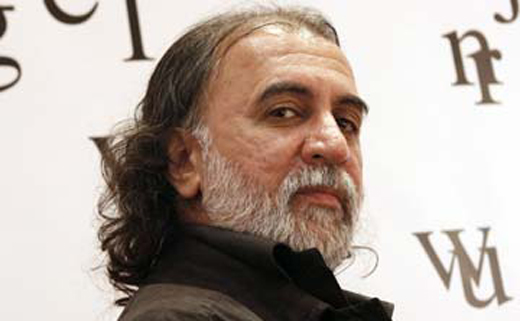
On November 27, BJP’s Leader of Opposition in the Lok Sabha Sushma Swaraj set the cat among the pigeons by tweeting that a Union minister, who was a "patron" of Tehelka, was "shielding" Tejpal. Law Minister Kapil Sibal hit back, daring Swaraj to name him instead of referring to him "tangentially". Sibal denies that he owns shares in Tehelka but says he "donated" Rs 5 lakh to them in 2003.
Tejpal has been booked for rape (IPC Section 376), rape by a person in a position of control or dominance (IPC Section 376(2)(k), and outraging the modesty of a woman (IPC Section 354). The conviction for rape by a person in authority carries a minimum punishment of 10 years in jail. The much-talked about Sexual Harassment of Women at Workplace (Prevention, Prohibition and Redressal) Act, 2013, passed by Parliament in February and given the nod by the President on April 23, remains only on paper because the Ministry of Women and Child Development has failed to get the rules framed due to a delay in the drafting process.
The son of an Army officer, Tejpal started his career in 1983 at The Indian Express in Chandigarh as a sub-editor whose love for big, booming words often had his colleagues reaching for the only dictionary in circulation at the desk. The story goes that there had been some talk among the senior editors about whether he should be hired at all, because he was too arrogant, "too sure of himself"-as if that is a character flaw.
In between editing copy, Tejpal would be sitting in the corner, reading Milan Kundera, or recent issues of Time and Newsweek, which made him come across as somewhat uppity to his relatively less-literary co-workers. "Back then," says a former colleague, "he had eyes only for Geetan (later his wife, who had joined around the same time)."
Both the copy desk and Chandigarh were too small to keep Tejpal interested for too long. He often spoke of moving to Delhi, to write about literature, to interpret the life and times of an India that was still changing at a slow pace. He got his break with a short stint at India 2000, and then with a job at the copy desk of INDIA TODAY in 1988. Here, a different side of Tejpal started to emerge-he was gregarious, witty, always up for a prank. His stock as a journalist began to grow, first with his rise as the editor of the books pages, and then as the notoriously hard-to-please V.S. Naipaul’s favourite literary editor.
The magazine, too, could hold his ambitions in check only for so long. By 1994, Tejpal had something bigger and more individualistic in mind. At the Sunday magazine of The Financial Express, he started to collect a crack team-one which believed in his style of leadership as a bold but laidback boss who gave them plenty of freedom. Tejpal joined Outlook in 1995 as its managing editor, staying with them for four years. Around that time, Arundhati Roy was searching for a publisher for her debut novel. Tejpal teamed up with photographer Sanjeev Saith to launch the publishing house India Ink that published the Booker-winning The God of Small Things. Everything he touched was turning into gold.
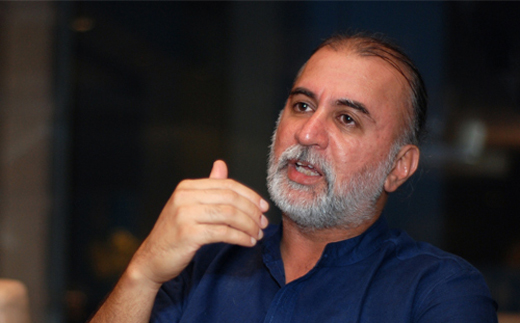
Tejpal then found his true calling as an angry idealist speaking the truth to power with the launch of Tehelka.com. The website, edited by him with Aniruddha Bahal as its hard-working ’stingman’, came into prominence with the grainy video footage of then BJP president Bangaru Laxman accepting a bribe from Mathew Samuel, an undercover Tehelka reporter, on March 14, 2001. Operation West End, which investigated corruption in defence deals, after resorting to unethical means such as the use of prostitutes to lure officials, also led to the resignation of the then defence minister George Fernandes.
It was an expose that made Tejpal larger than life. It led to a spate of other stings, semi-stings and dressed-up-stings from numerous TV channels, forever changing the way the media viewed itself and its subjects. In 17 years, Tejpal had come from a quiet, nose-to-the-grindstone editor subbing stories about a new course at Panjab University to an editor who had brought a national government to its knees. The mythology of Tejpal as the dissenter was in the making.
But Tejpal’s success was not unaccompanied by controversy. His finest hour was also, perhaps, the crest of the wave that he had been riding-at least in his incarnation as a journalist. The BJP-led government started to target Tehelka’s reporters and backers. The owners of First Global, a brokerage promoted by Shankar Sharma and Devina Mehra which had a 14.5 per cent stake in Tehelka, were hounded on trumped-up charges of market manipulation. As financiers were scared away, Tejpal fell into the pockets of investors with vested interests who he had to protect in order to stay afloat. It brought him closer to the Congress than he would have liked, and led to allegations from some journalists that their stories were being held back for commercial reasons.
Tejpal often likes to say, perhaps a tad pretentiously, that Tehelka represents an "idea". Even if this idea encourages his own personal cult, it stands for a left-liberal philosophy of which he is arguably the hardest-hitting crusader. The idea was an amorphous being that took various forms, going in whichever direction its basic survival forced it to. Tehelka transformed into a weekly tabloid in 2004. In 2007, it became a weekly news magazine. The magazine got a major boost in 2009 when controversial Trinamool Congress MP K.D. Singh invested Rs 25 crore in Tehelka’s holding company Anant Media Private Limited, in which Tejpal’s family members were shareholders.
He is one of the few journalists who made the transition from fact to fiction with remarkable ease and success. In his novels, the sensuous and the cerebral merge seamlessly; the vulgarity of power is set against the existential picaresque of the victim. His first novel, The Alchemy of Desire, became a bestseller in France. The white beard, the ponytail, the heavily loaded turn of phrase, the chic collection of friends in India and abroad-from Aamir Khan to Tina Brown-all became elements of Tejpal’s aura, even while he was accused of either abandoning the idea of Tehelka altogether or diluting it to a point where he could disassociate its sources of funding from its journalism.
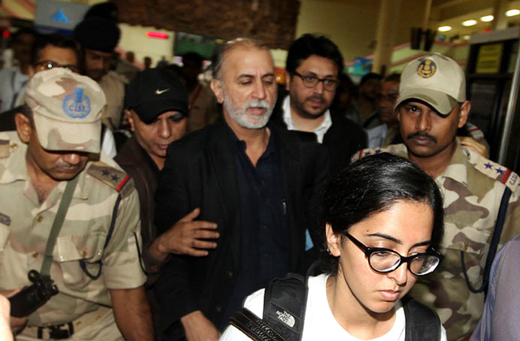
The most cutting comment on the ideals that Tejpal ostensibly upheld came from the alleged rape victim in the aftermath of the scandal. A day after the second incident on November 8, he had sent a message rebuking her for speaking about it to his daughter Tiya: "I can’t believe you went and told her even the smallest thing. What a complete absence of understanding of a parent-child relationship." To which the woman journalist replied: "I can’t believe you think molesting an employee your daughter’s age, who is also your daughter’s friend, is something you’d describe as ’the smallest thing’. What an absence of understanding of what Tehelka stands for."
This squalid saga is not significant only because its central character is a celebrated journalist who purportedly stood for the same principles of equality, trust and transparency that he has been charged of violating. It is already emerging as a test case for sexual harassment in the workplace and rape in urban, and urbane, India.
Tejpal’s lawyers are now picking holes in the woman’s testimony, which unlike his own versions of the events, has remained unchanged from the start. They are asking why she remained at THiNK, and why she "continued to party" despite the alleged sexual assaults. They are also raising the issue of a 10-day delay in bringing the incidents to the notice of Tehelka on November 18.
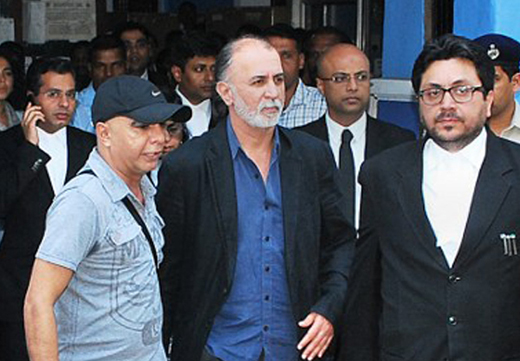
According to senior advocate Vikas Pahwa, Tejpal’s main defence can only be that the girl was a consenting adult. Another could be that sexual assault in the elevator of a two-storyed building is improbable. "The only other defence can be imputing a motive behind the complaint-that it is a political conspiracy, as he has tried, or that the woman was a disgruntled employee," says Pahwa.
The woman, according to senior advocate Aman Lekhi, stands on firmer ground. Her strongest line of argument is the letters sent to her by Tejpal in which he admitted he’d tried to have a sexual liaison with her without her consent. Lekhi said the victim’s conduct after the incident cannot undermine the incident. "By saying that the conversation between them preceding the incident was flirtatious, Tejpal is wrongly assuming that the victim is open to any advance made on her. He even tells her at one point that he is her boss."
In the beginning, as the emails from the woman leaked, Chaudhury and Tejpal became the most dissected items on TV and in social media. It was apparent that the Tehelka team was more emotional, even amateurish, rather than professional in its responses. The team indulged in lyrical prose, using language to impress rather than express. In contrast, the woman’s letters had the clarity of one clinically collecting evidence.
The speed, alacrity and nature of the police action has taken the citizens of India’s smallest state by surprise. It raised an alarm in the Tejpal camp, which sniffed a BJP conspiracy. The Goa Police, which evoked a rarely used provision of CrPC 154 to take suo motu cognisance, giving some credence to Tejpal’s allegation of a political agenda, In his anticipatory bail, Tejpal said that the party had "unleashed the wrath of its vengeance upon him in the garb of the present fir". But Goa Chief Minister Parrikar shot back: "He didn’t realise there was a BJP government in Goa when he held the function, initially apologised, or went on ’sanyas’ (in Tejpal’s words, recused himself to do the penance that lacerates him). When he is falling into his own trap, he realises this?"
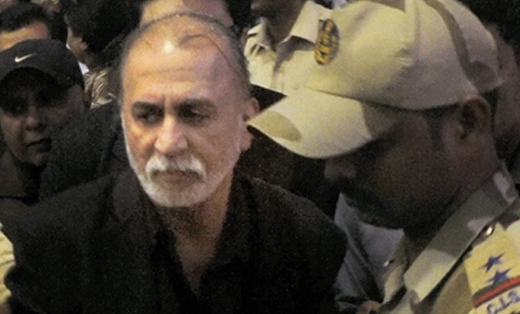
Goa Police spoke to the woman at a "neutral, undisclosed" location in Mumbai on November 26, with a Mumbai woman police inspector accompanying the investigating officer Sunita Sawant. Police sources say the alleged victim was "clear, unfaltering, sharp" as she narrated the sequence of events. She carefully took them through the trail of emails before and after the offence. The question of why she would enter the elevator with Tejpal a second time was raised, as was the delay in filing the complaint. "The victim’s oral testimony matches exactly with what she had stated in her email," an officer said. The woman then flew to Goa on November 27 to record her statement in front of a magistrate. Friends who spoke to her said she sounded tired, harried, but resolute.
In the end, it was not Tejpal as Icarus, or Tejpal at the receiving end of a bad karmic joke. He loved metaphors. And he thought for a while that metaphors would save the day, as his first letter of atonement reveals. The text of his alleged crime gets magnified because the context has changed. Urban India after the Delhi gang rape is a different place, where the judgments from streets and cyberspace are as influential as the pronouncements from court rooms.
From the framed promotional poster of Tehelka’s launch, Tejpal stares at eternity with bearded gravitas, and the printed text is prescient to a fault: "You cannot change the truth. But the truth can change you." An organisation built on the lofty concept of public journalism could not have had a better message; and the founder of that organisation, one of the finest minds in Indian media, is in the middle of a life-changing encounter with truth. Jhooth Bole Kauwa Kaate: The crows are circling.
- With Sandeep Unnithan, Jayant Sriram, and Bhavna Vij-Aurora
- How Many Kratom Capsules Should You Take?
- ’Satan’s Last Stronghold’ - US Man wrote before death on Andaman Island
- Net neutrality debate rages on; expert panel report by mid-May
- Rich and Mighty Get Away Lightly for Rash Driving, Says Supreme Court
- US may be indirectly funding religious conversion in India
- India Once Again Awakens To Freedom
- RTI query results in Rs 1.87 cr recovery from toll operator
- How To Handle Cell phones and Your Children: Some Basic Advice
- D K Ravi’s Death No more Mistery
- Modi And The Paradox Of The Middle-Class Millennials
- As a Christian, suddenly I am a stranger in my own country, writes Julio Ribeiro
- Beef Ban: What Are The Cows Really Getting Out Of It?
- Malpe: Hotel gutted in fire mishap
- 99 sub-castes among Muslims, 57 in Christians: Karnataka Caste Census
- Mangaluru: Youth from Mumbai drowns in sea, another missing
- MP lays foundation for two road projects in Sullia taluk
- MCC workers to scan QR code via smartphones while collecting garbage
- Bantwal youth passes away in South Africa; final rites held in native village
- Double tie stuns Gurupura Kambala as buffalo pairs match speeds twice
- Newborn’s body found inside mosque premises in Malpe; police launch investigation
- Uppinangady: 13 injured as KSRTC bus crashes against divider
- Kasargod: Accused arrested in Manjeshwar auto driver murder; Revenge motive suspected
- Kasargod: Woman set on fire by harasser dies after week-long battle for life
- Udupi: 1 dead, another critical in collision between pick-up vehicle and bus
- Mangaluru: Woman, 3 year old son missing
- Patient dragged, beaten: Karnataka rehab centre spark outrage
- Two Naxals killed in Bastar encounter; AK-47 rifle, explosives recovered
- Court’s big order in MUDA site allotment case involving Siddaramaiah
- M K Stalin constitutes a committee to review Centre-State relations
- India’s Haj quota rises to 1.75 lakh in 2025, highest in a decade
- If you want son, you cannot...: Supreme Court tough on child trafficking
- Money laundering case: ED summons Robert Vadra in land deal
- Davanagere: Woman assaulted after husband complaints against her at Mosque
- Amid tears, Hubballi girl laid to rest; govt announces Rs 10L compensation to kin
- Many injured, police cars torched: Waqf protest in Bengal turns violent again
- Suspect in Bengaluru molestation case held from Kerala after massive police manhunt
- Who was Joy Saini, Indian-origin doctor killed in New York plane crash
- CITY INFORMATION
- TRAVEL
- TOURIST INFORMATION
- HEALTH CARE
- MISCELLANEOUS




 Write Comment
Write Comment E-Mail To a Friend
E-Mail To a Friend Facebook
Facebook Twitter
Twitter  Print
Print 


